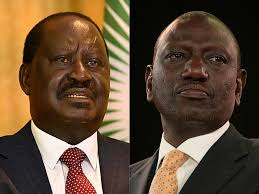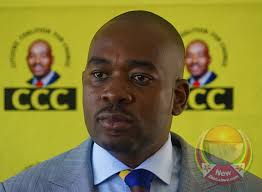ODINGA REJECTS VOTE RESULTS

ruto & odinga
William Ruto was declared the winner of Kenya’s presidential election by a razor-thin margin on Monday, seeing off a challenge from five-time contender Raila Odinga.
Deputy President Ruto garnered 50.5% or 7.1-million of the valid votes and his main rival Odinga 48.9%, the independent electoral & boundaries commission (IEBC) said.
Ruto has pledged to rein in debt, spend 500-billion shillings ($4.1bn) to support entrepreneurs and farmers, create jobs for millions of unemployed youths and give half the posts in his cabinet to women.
Start the conversation
Have your say. Leave a comment below and let us know what you think.
Scuffles broke out shortly before the release of the results, as four of the country’s seven electoral commissioners announced that they did not accept the outcome of the August 9 vote.
“We cannot take ownership of the results that are being announced because of the opaque nature with which the results have been handled,” IEBC vice-chair Juliana Whonge Cherera told a televised briefing at a separate venue.
Security concerns
Shots rang out as Odinga supporters stormed the podium where the IEBC officials were gathered before the results announcement. Foreign diplomats left the centre for safety, said two sources.
IEBC chair Wafula Chebukati said he stood by the results despite being subjected to intimidation and harassment. “I’ve done my duty according to the constitution,” he said after troops restored order.
Kenya’s 2024 Eurobonds extended their losses, with the yield rising 370 basis points to 15.855% by 6.33pm in Nairobi.
‘No losers’
“In this election there are no losers,” Ruto said in a speech after being declared the winner. “The people of Kenya have won because we have raised the political bar.”
Ruto’s running mate was Rigathi Gachagua, a central Kenyan MP, who will become deputy president. Odinga’s campaign was backed by incumbent leader Uhuru Kenyatta, who is stepping down after serving the maximum two terms. Opinion polls conducted in the lead-up to the vote showed the 77-year-old former prime minister had a slight edge in the race.
The election was held amid soaring living costs and a crippling drought. Public debt totalled 8.56-trillion shillings by the end of May — servicing it is projected to eat up more than half of the state revenue, and the International Monetary Fund has warned the nation is at high risk of debt distress. Ruto has ruled out restructuring the debt, an option favoured by his rival.
Odinga, a former prime minister, has yet to react to the results, although some of his campaign officials said they rejected the outcome. To challenge them, he must petition Kenya’s supreme court within seven days, and it must make a final ruling on their validity within 14 days. Should the results be nullified, as in 2017, fresh elections must be held within 60 days of the ruling. Ruto will be sworn in later in August if there is no court petition.
Ethnic fighting
Ruto says he started out in business by selling live chickens on a roadside, went on to own one of the country’s biggest poultry farms and expanded into hospitality and real estate. He entered politics in his 20s, winning a parliamentary seat in 1997.
Ruto and Kenyatta were on opposing sides in a disputed 2007 vote that triggered ethnic fighting and the International Criminal Court charged them with crimes against humanity. Both men denied wrongdoing and the cases were dropped due to a lack of evidence.
Ruto then backed Kenyatta in the 2013 and 2017 elections on the understanding there would be a quid pro quo after the incumbent stepped down. But the two fell out in 2018 after Kenyatta reconciled with Odinga after a long-running feud.








